Demolition Contractors Maple Glen
Find Demolition Company Near Me in Maple Glen
Receive up to 3 Demolition Companies quotes for your project today! Compare profiles, reviews, accreditations, portfolio, etc... and choose the best deal.
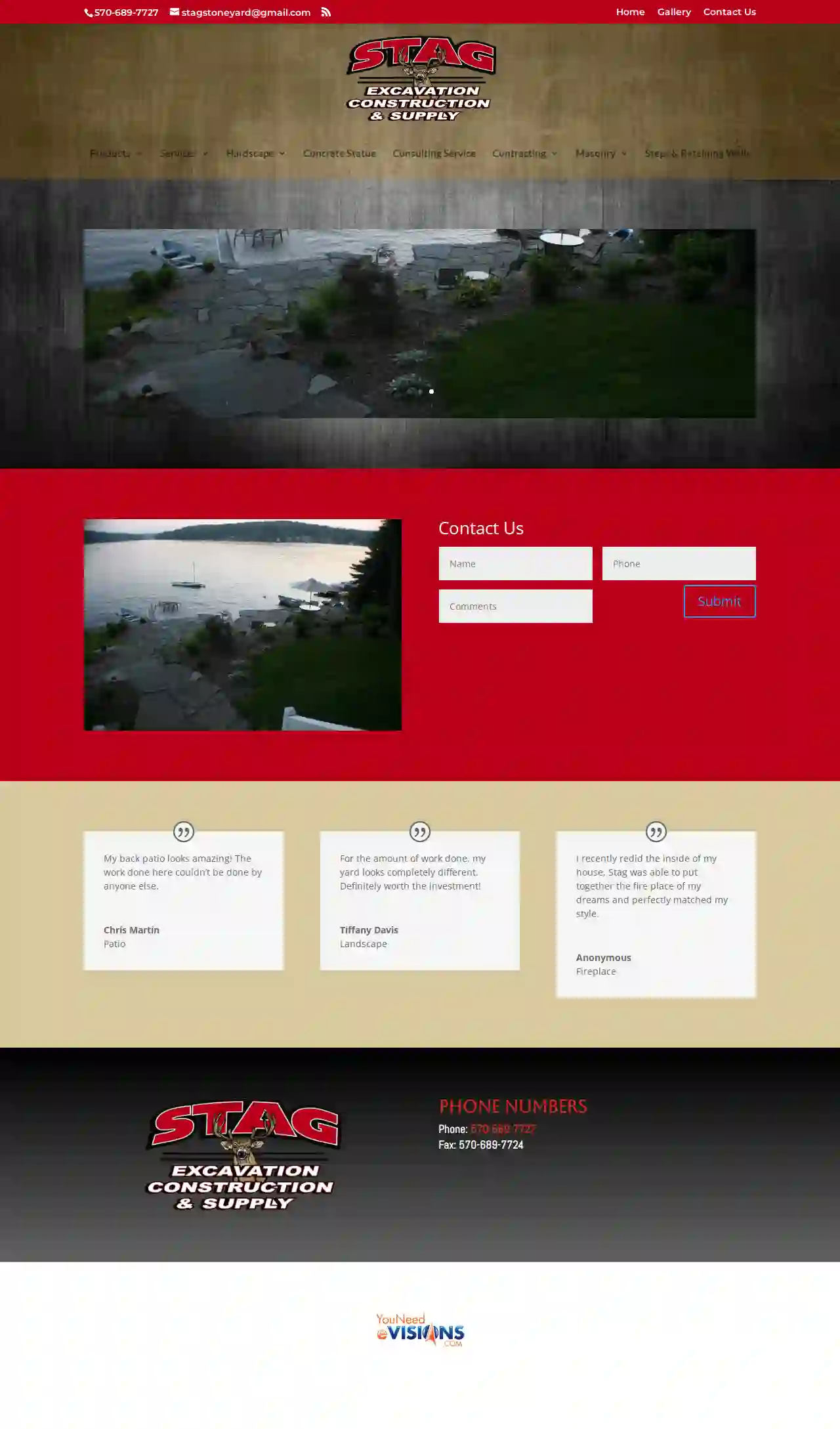
Stag Excavation Construction & Supply
52 reviewsHamlin, USStag Excavation & Stone Yard Stag Excavation & Stone Yard is a family-owned and operated business serving the Hamlin, PA area. We offer a wide range of services, from excavating and demolition to hardscaping and custom home construction. We are committed to providing our clients with high-quality workmanship and exceptional customer service. Our team of experienced professionals is dedicated to exceeding your expectations and delivering projects on time and within budget. We are proud to be a trusted name in the community and look forward to serving your needs. We are located just outside of Hamlin Corners in Hamlin PA. We offer free estimates on all of our services. Contact us today to schedule a consultation.
- Services
- Why Us?
- Testimonials
- Gallery
Get Quote
ES Excavation
56 reviewsESExcavation.com, Newtown Square, Pennsylvania, 19073, USExcavation Contractors serving Southeast PA If you are a residential or commercial customer in Southeast PA and the surrounding region, ES Excavation is here to help anytime you need someone to dig in the dirt. We are a full-service excavating contractor, and can also provide you with landscape design and storm water solutions. We aim to complete each of our projects in an efficient and cost-effective way. We don’t cut corners and we always take proper precautions to prevent any potential problems and dangers while striving to ensure that the project is complete on time and under budget. We take the time to meet with all of our clients to ensure that every project is completed to their standards. Providing us with your vision, goals and timeline allows us to do our job even better. Every client we meet and do business with is satisfied with our work. That’s because we work with you, and have a genuine interest in achieving your project goals.
- Services
- Why Us?
- Gallery
Get Quote
NYC Excavation Contractor
York, USAbout NYC Excavation Contractor NYC Excavation Contractor is a premier provider of excavation services in New York City. With a dedicated team of professionals and top-of-the-line equipment, we deliver unmatched quality in every project we undertake. Our commitment to excellence has earned us a reputation for delivering exceptional results. From clearing land to precision grading, we have successfully completed numerous projects, exceeding client expectations at every turn. Our Commitment Missions & Values Driven by Purpose Our Mission To provide reliable, efficient, and top-quality excavation services to our clients, ensuring their projects are successful and their visions are brought to life. Core Principles Our Values We uphold integrity, professionalism, and client satisfaction as the cornerstones of our operations, fostering relationships based on trust, transparency, and mutual respect. Our Journey Company History Founded in the heart of NYC, NYC Excavation Contractor has grown from humble beginnings to become a trusted name in the industry. With a track record of excellence, we continue to push boundaries and set new standards. Over the years, we have expanded our services, improved our techniques, and embraced innovation to stay at the forefront of the excavation sector. Our journey is defined by continuous growth and a relentless pursuit of perfection.
- Services
- Why Us?
- Testimonials
- Gallery
Get Quote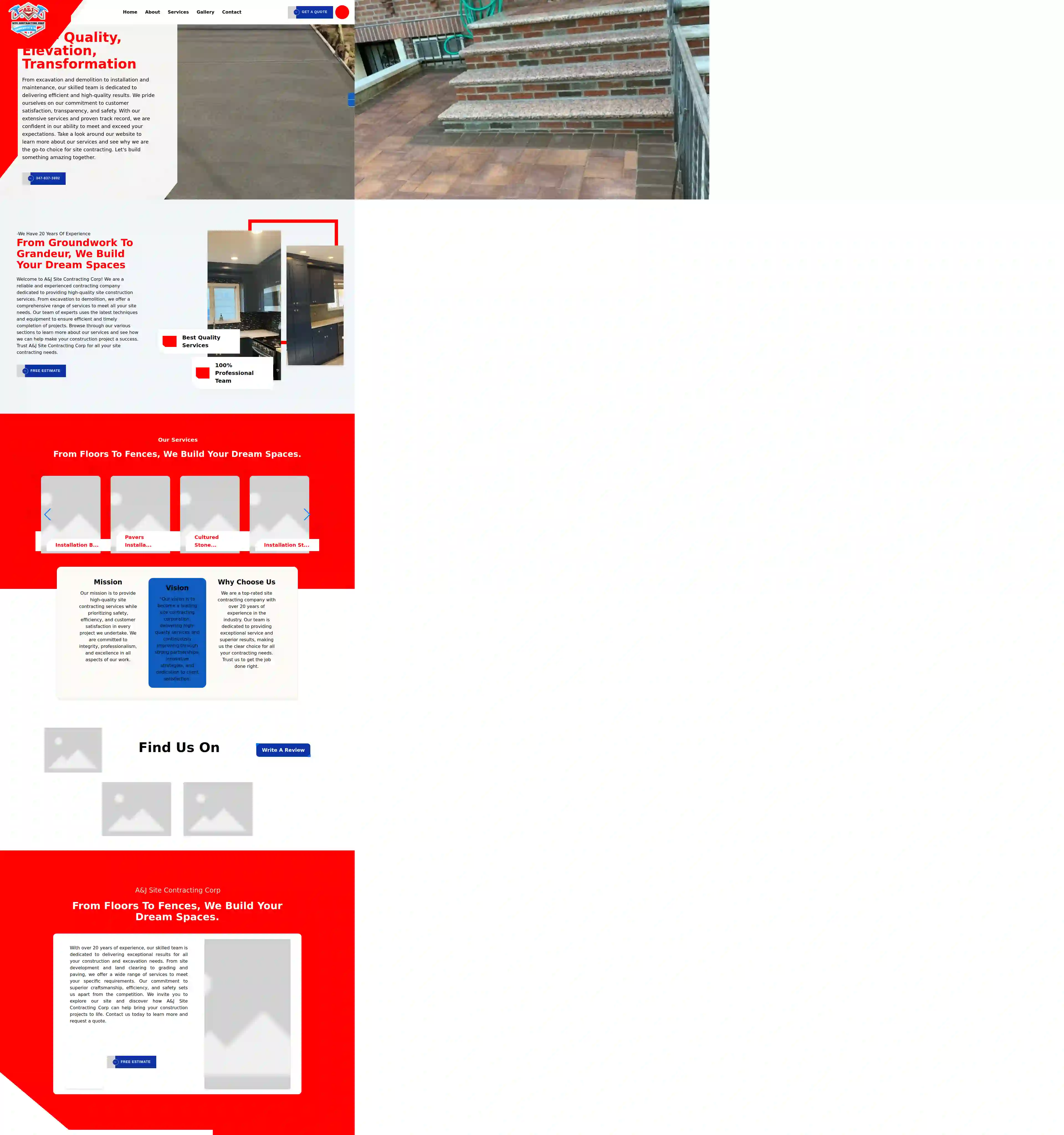
A&J Site Contracting Corp
57 reviewsYork, USA&J - Quality, Elevation, Transformation From excavation and demolition to installation and maintenance, our skilled team is dedicated to delivering efficient and high-quality results. We pride ourselves on our commitment to customer satisfaction, transparency, and safety. With our extensive services and proven track record, we are confident in our ability to meet and exceed your expectations. Take a look around our website to learn more about our services and see why we are the go-to choice for site contracting. Let's build something amazing together. -we have 20 years of experience From groundwork to grandeur, we build your dream spaces Welcome to A&J Site Contracting Corp! We are a reliable and experienced contracting company dedicated to providing high-quality site construction services. From excavation to demolition, we offer a comprehensive range of services to meet all your site needs. Our team of experts uses the latest techniques and equipment to ensure efficient and timely completion of projects. Browse through our various sections to learn more about our services and see how we can help make your construction project a success. Trust A&J Site Contracting Corp for all your site contracting needs.
- Services
- Why Us?
- Our Team
- Gallery
Get Quote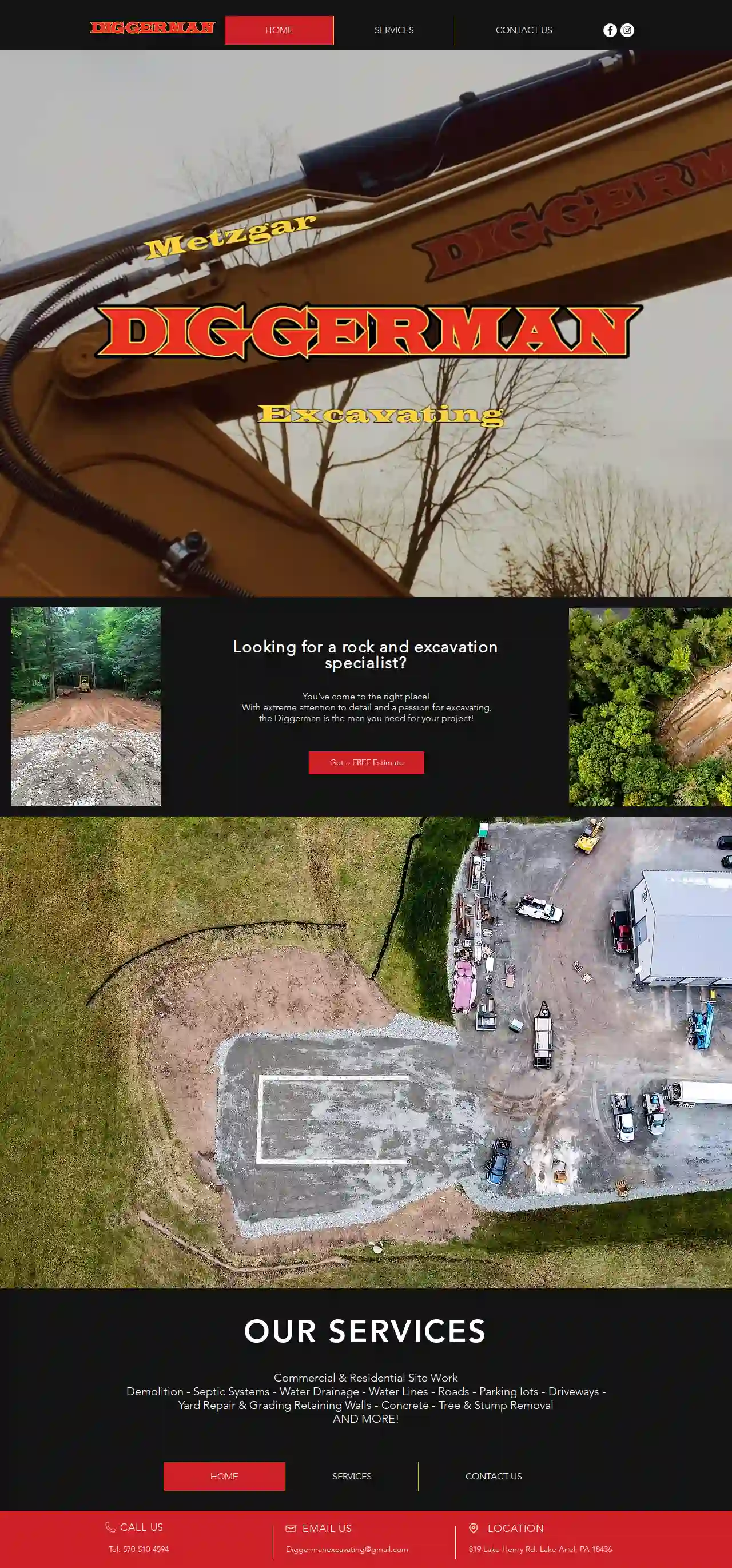
Diggerman Excavating
819 Lake Henry Rd., Lake Ariel, 18436, USLooking for a rock and excavation specialist? You've come to the right place! With extreme attention to detail and a passion for excavating, the Diggerman is the man you need for your project!
- Services
- Why Us?
- Gallery
Get Quote
Kizer Landscaping & Excavating
4.897 reviewsGreentown, USExperience the Difference Kizer Landscaping and Excavation No matter how big or small your landscaping job is, Kizer Landscaping & Excavating is here for you! We give you the best value, the best service, and you can depend on us to get the job done right. We are a locally owned and operated business based in Greentown, Pennsylvania. About Explore our Services Kizer Landscaping and Excavation We offer a variety of services, including landscaping, topsoil, stump removal, gravel driveway installation and repair, as well as many hardscaping services to enhance the look of your outdoor space and increase your home's value! Kizer Landscaping & Excavating also provides maintenance services for residential & commercial properties, on either a 7-day or 14-day cycle. Learn our History Kizer Landscaping and Excavating was founded in 2008 by Craig Kizer in Pike County. At age 8, Craig mowed his first lawn, and in the years that followed he developed a greater attention to detail for both lawn care and landscaping work. Turning his love and passion for the outdoors into a career was a natural step for Craig, seen today in the value and quality of his company’s work. Meet Craig and His Team >
- Services
- Why Us?
- Testimonials
- Gallery
Get Quote
Winola Excavating
57 reviews64 Benson Hollow Ln, Tunkhannock, 18657, USWinola Excavating – Delivering quality service and expert craftsmanship for all your construction and excavation needs. We are a full-service local contractor specializing in residential, commercial and industrial excavation and construction services. Our clients include homeowners, business owners, landlords, real estate agents, builders, contractors and developers. What sets us apart? Typically, we are able to provide same day estimates and will show up on time prepared to deliver exceptional service to you. In fact, we have limited to no rescheduling (dependant on weather), price our jobs fairly and get them done in a timely fashion. Your satisfaction is our number one goal. And with 10 years of customer service management experience, we know how to deliver.
- Services
- Why Us?
- Gallery
Get Quote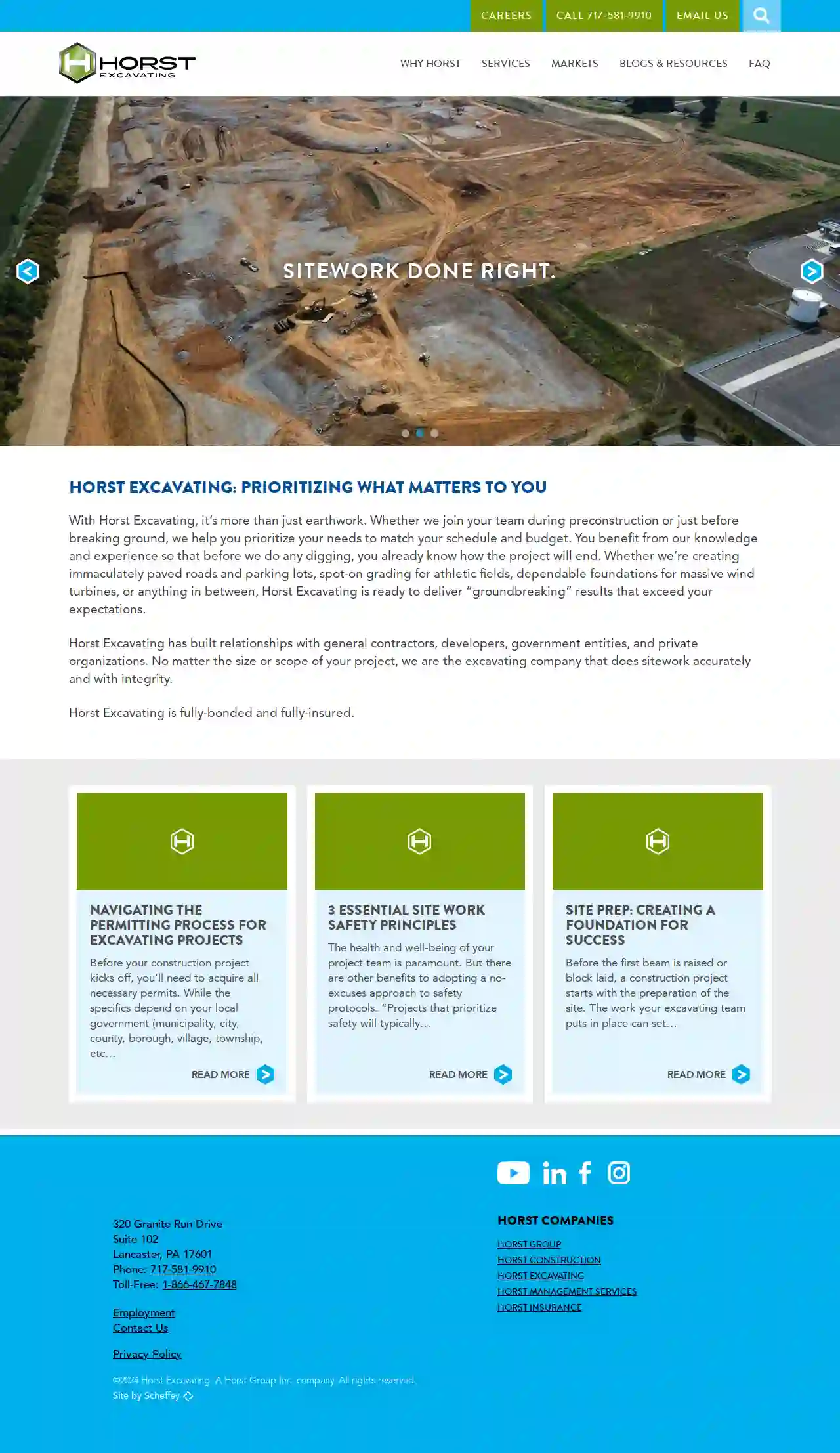
Horst Excavating
416 reviews320 Granite Run Drive, Suite 102, Lancaster, 17601, USHorst Excavating: Prioritizing What Matters To You With Horst Excavating, it’s more than just earthwork. Whether we join your team during preconstruction or just before breaking ground, we help you prioritize your needs to match your schedule and budget. You benefit from our knowledge and experience so that before we do any digging, you already know how the project will end. Whether we’re creating immaculately paved roads and parking lots, spot-on grading for athletic fields, dependable foundations for massive wind turbines, or anything in between, Horst Excavating is ready to deliver “groundbreaking” results that exceed your expectations. Horst Excavating has built relationships with general contractors, developers, government entities, and private organizations. No matter the size or scope of your project, we are the excavating company that does sitework accurately and with integrity. Horst Excavating is fully-bonded and fully-insured.
- Services
- Why Us?
- Gallery
Get Quote
Kuch Construction and Excavation
4.712 reviews575 South Franklin Street, Hanover, 17331, USA Little Bit About Kuch Construction and Excavation With over 15 years of experience in the building and excavating industry, Kuch Construction and Excavation has established itself as a reliable and trusted contractor in the region. Our team has worked on a variety of projects, from small residential garages to large-scale commercial buildings as well as small and large agricultural buildings. Our Commitment to Quality At Kuch Construction and Excavation, we are committed to delivering high-quality workmanship on every project. We use only the best materials and equipment, and we ensure that our team is up-to-date with the latest building techniques and industry standards. Our Client Satisfaction Our clients' satisfaction is our top priority. We work closely with them to ensure that their vision is fully realized and that the project is completed on time and within budget. We strive to exceed their expectations and to build long-lasting relationships. From Humble Beginnings Founded in 2011, Kuch Construction and Excavation was born out of a passion for building and a desire to provide top-quality services to clients in need. Over the years, we've grown to become one of the most trusted general contractors in the area. What We Do Here at Kuch Construction and Excavation we offer a wide range of services. First and foremost are our Pole Buildings. We offer a turn key package to our customers to ensure the job is done right and exactly the way our customers wanted. Our services include: excavating, framing, insulation, electric, roofing, siding, concrete, hvac, and plumbing. Whether you are looking for a plain building, or one with all the bells and whistles, we are your one stop shop for it all!
- Services
- Why Us?
- Gallery
Get Quote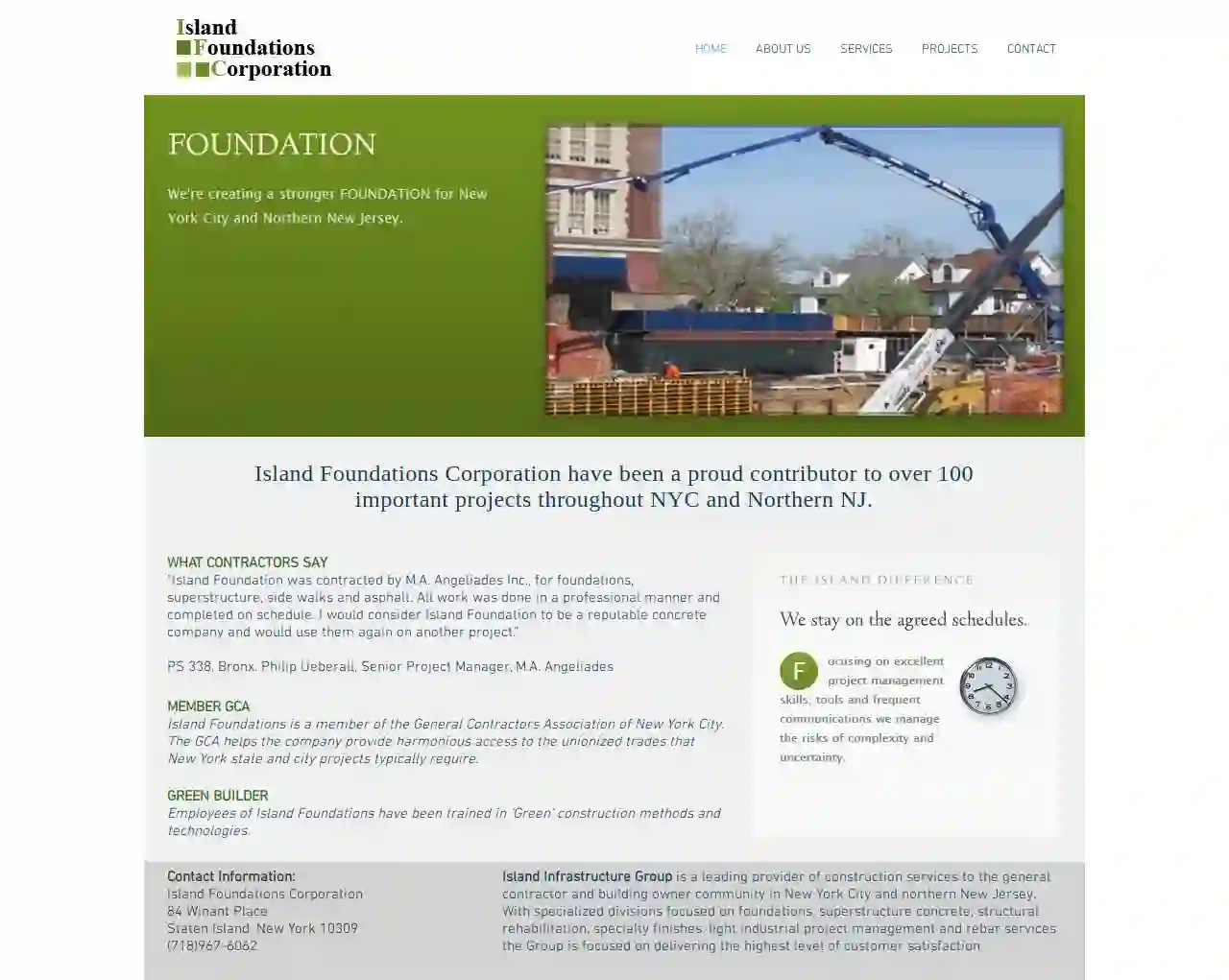
Island Foundations Corporation
54 reviews84 Winant Place, Staten Island, 10309, USIsland Foundations Corporation Island Foundations Corporation has been a proud contributor to over 100 important projects throughout NYC and Northern NJ. We are a leading provider of construction services to the general contractor and building owner community in New York City and northern New Jersey. With specialized divisions focused on foundations, superstructure concrete, structural rehabilitation, specialty finishes, light industrial project management and rebar services, we are focused on delivering the highest level of customer satisfaction. Our team is comprised of experienced professionals who are dedicated to providing our clients with the highest quality workmanship and service. We are committed to safety, quality, and on-time delivery. We are also committed to being a good neighbor and contributing to the communities in which we work. We are a member of the General Contractors Association of New York City (GCA). The GCA helps us provide harmonious access to the unionized trades that New York state and city projects typically require. Our employees have been trained in ‘Green’ construction methods and technologies.
- Services
- Why Us?
- Testimonials
- Gallery
Get Quote
Over 22,076+ Excavation Pros in our network
Our excavation contractors operate in Maple Glen & surrounding areas!
ExcavationHQ has curated and vetted Top Excavation Contractors arround Maple Glen. Find a reliable contractor today.
Frequently Asked Questions About Demolition Contractors
- Safety: Experienced contractors have the knowledge, skills, and safety training to execute demolitions safely, minimizing risks to workers and surrounding areas.
- Efficiency: Contractors have the specialized equipment and expertise to complete demolitions efficiently, saving time and reducing project costs.
- Compliance: Reputable contractors are familiar with local regulations and permitting requirements, ensuring compliance and avoiding legal issues.
- Waste Management: Contractors have waste management plans to handle debris responsibly, including recycling and proper disposal.
- Liability Protection: Insured contractors protect you from financial responsibility for accidents or damages during the demolition process.
- Size and Complexity of the Structure: Larger and more complex structures, such as multi-story buildings, require more time, labor, and specialized equipment, increasing costs.
- Type of Demolition: Different demolition methods, such as implosion, wrecking ball, or high-reach demolition, have varying costs.
- Material Disposal: Disposal fees for demolition debris can contribute significantly to the overall cost, depending on the type and quantity of materials.
- Location and Accessibility: Demolition in densely populated areas or with limited access may require more planning and specialized equipment, affecting costs.
- Hazardous Materials: The presence of asbestos, lead paint, or other hazardous materials requires specialized removal and disposal procedures, adding to the expenses.
What are the benefits of hiring a professional demolition contractor?
How can I tell if my building contains asbestos?
What is asbestos abatement?
How much does demolition cost in the USA?
What are the benefits of hiring a professional demolition contractor?
- Safety: Experienced contractors have the knowledge, skills, and safety training to execute demolitions safely, minimizing risks to workers and surrounding areas.
- Efficiency: Contractors have the specialized equipment and expertise to complete demolitions efficiently, saving time and reducing project costs.
- Compliance: Reputable contractors are familiar with local regulations and permitting requirements, ensuring compliance and avoiding legal issues.
- Waste Management: Contractors have waste management plans to handle debris responsibly, including recycling and proper disposal.
- Liability Protection: Insured contractors protect you from financial responsibility for accidents or damages during the demolition process.
How can I tell if my building contains asbestos?
What is asbestos abatement?
How much does demolition cost in the USA?
- Size and Complexity of the Structure: Larger and more complex structures, such as multi-story buildings, require more time, labor, and specialized equipment, increasing costs.
- Type of Demolition: Different demolition methods, such as implosion, wrecking ball, or high-reach demolition, have varying costs.
- Material Disposal: Disposal fees for demolition debris can contribute significantly to the overall cost, depending on the type and quantity of materials.
- Location and Accessibility: Demolition in densely populated areas or with limited access may require more planning and specialized equipment, affecting costs.
- Hazardous Materials: The presence of asbestos, lead paint, or other hazardous materials requires specialized removal and disposal procedures, adding to the expenses.